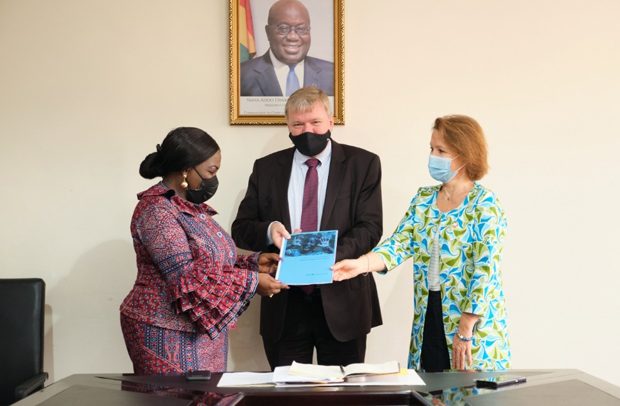(From left) Madam Cecilia Abena Dapaah, Ambassador Tom Nørring, and UNICEF country representative Anne-Claire Dufay.
The Embassy of Denmark in Ghana and UNICEF have entered into a partnership with the government to undertake a 12-month project to support the national Covid-19 response.
The DKK 35 million (or US$5.6 million) project will focus on enhanced water, sanitation and hygiene infrastructure, Covid-19 infection prevention control, improved community-based planning approaches as well as strengthened sexual and gender-based violence services.
Expected to complement and expand the scope of the overall sustainable recovery plans as set out by the government, the project will concentrate on six to eight low-income and high-density urban communities in the Greater Accra and Ashanti regions.
Minister of Sanitation and Water Resources, Cecilia Abena Dapaah, representing the government at the agreement signing ceremony said as the country records an increasing number of Covid-19 cases, resilient water sanitation and hygiene facilities are essential to curtail the spread of the coronavirus, and to achieve the long-term goals of Open Defecation Free, and the provision of potable water to all Ghanaians.
“The Government of Ghana is delighted to see the commencement of this 12-month UNICEF and Embassy of Denmark project, and the Ministry of Sanitation and Water Resources is looking forward to close cooperation to realize our goals,” she said.
Ambassador of Denmark to Ghana, Tom Nørring, said after almost 60 years of close cooperation between Ghana and Denmark, it is important for Denmark to show solidarity during these difficult times of the pandemic.
He said the project will support and underpin the tireless work done by the government of Ghana to manage the pandemic by expanding water access and hygiene practices in deprived urban areas.
“From our side we will do our utmost to make this cooperation, but also our other partnerships in the area of water and wastewater management, a success,” Ambassador Nørring said.
UNICEF Country Representative, Anne-Claire Dufay, added that the most vulnerable children and families in urban areas are facing the brunt of primary and secondary impacts of the Covid-19 pandemic.
“We are ensuring the strong engagement of communities, which is essential to address the needs of the most marginalized and have a positive impact. More child-friendly gender-based violence courts will also benefit vulnerable women and children.
Within the framework of the United Nations Sustainable Development Partnership (UNSDP) and the Socio-Economic Response and Recovery Plan (SERRP), this programme will complement the efforts of all UN Agencies in Ghana to support the Government in ensuring sustainable and resilient recovery from the effects of the COVID-19 pandemic,” she added.
By Jamila Akweley Okertchiri


